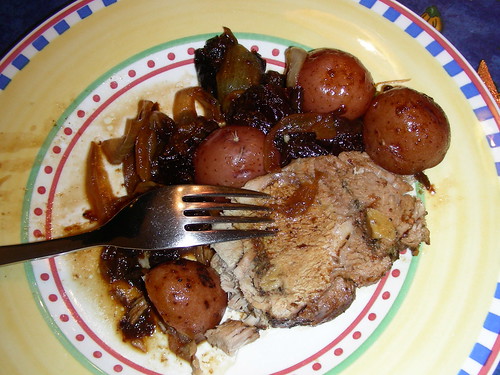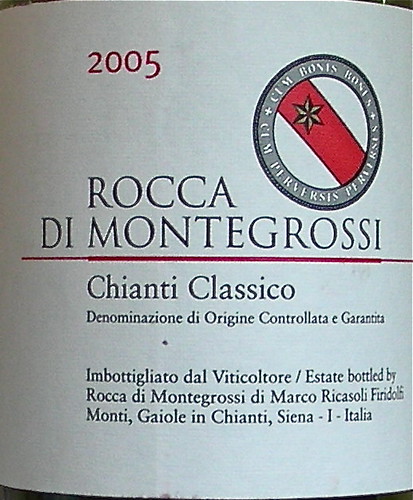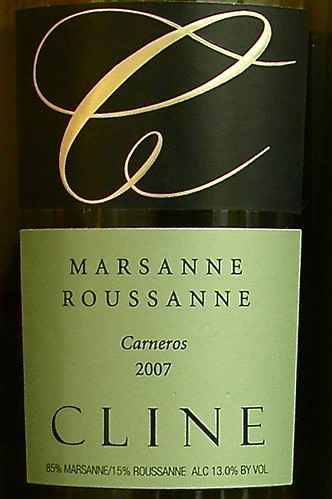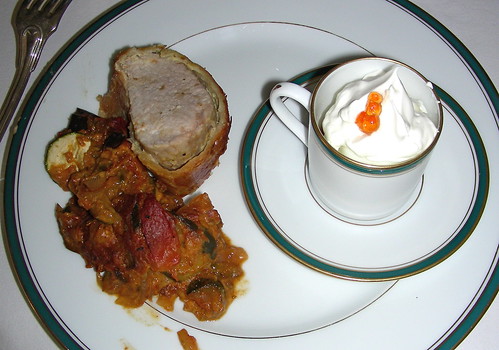Earlier this fall, we had our second annual
Guess the Wine tasting party where guests are asked to identify the varietal, region, and vintage of the wine. To add to the fun and ensure that the tasting was completely blind, each wine was transferred beforehand into a completely random bottle. That evening, we tasted 6 different single varietal wines from different regions including Australia, California, France, and New Zealand. Here they are:
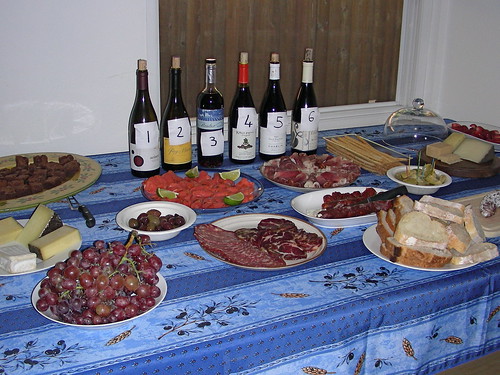
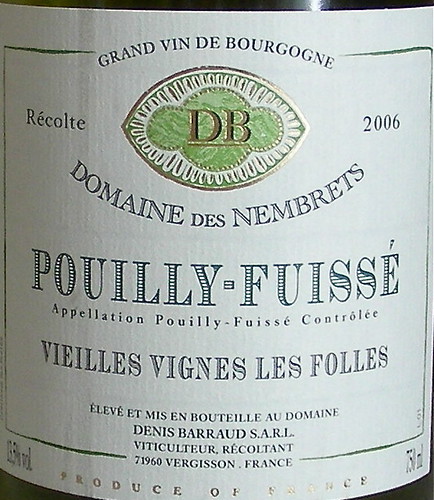
•
2006 Pouilly Fuissé Les Folles Vieilles Vignes Domaine des Nembrets: located in the south of Burgundy,
Pouilly-Fuissé is one of the best known appellation of the Mâconnais. It is a white only appellation producing wines from the Chardonnay grape. Domaine des Nembrets is a tiny estate west of the town of Mâcon. The wine is made from 50 year old vines from a south-west facing vineyard called
Les Folles. Grass is left to grow on the vineyard to force the roots of the vines to dig into the deep topsoil. The wine is fermented and aged in 100% stainless steel. My notes: light golden color, peach, tropical aromas on the nose, light to medium-bodied, good acidity on the palate, grapefruit notes and minerality on the finish. Because of its crispness and minerality, some guests identified the wine as a Sauvignon Blanc.

•
2006 Georges Vernay Viognier Le Pied de Samson: the
Domaine Georges Vernay is a 16 hectare family owned winery with vineyards mostly in the
Condrieu and
Côte Rotie appellations. Georges Vernay (now retired) is renowned for having almost single-handedly resuscitated the Condrieu appellation as well as Viognier the local grape. The cuvée called
Le Pied de Samson comes from vines growing on the upper slopes of Condrieu (above 300 meters), an area excluded from the appellation because of the elevation. The wine is aged in stainless steel vats. My notes: light yellow color, fragrant nose of litchi fruit and rose petal, fat mouthfeel with fresh raspberry notes on the palate, spicy finish. Not everybody was familiar with the Viognier grape but those who had tasted it before were able to recognize it.
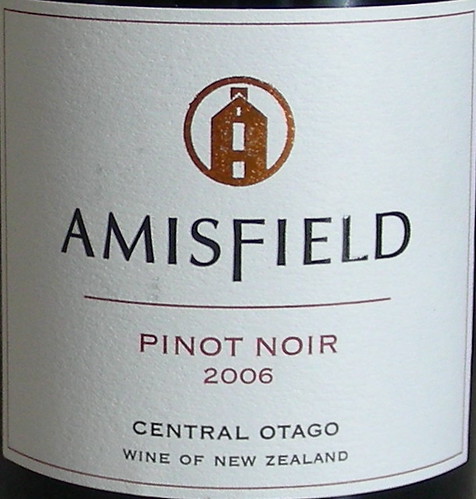
•
2006 Amisfield Pinot Noir:
Amisfield is a New Zealand producer of Pinot Noir, aromatic whites and sparkling wines. It is located in
Central Otago, the most southerly wine producing region in the world where Pinot noir is the leading grape variety (approximatively 70% of plantings). The estate consists of 60 hectares of Pinot Noir, Pinot Gris, Riesling and Sauvignon Blanc. My notes: medium red color, raspberry, vanilla on the nose, medium-bodied on the palate with some acidity, rather short finish, slightly disappointing. Many guests were confused about the wine and few identified it as a Pinot Noir.
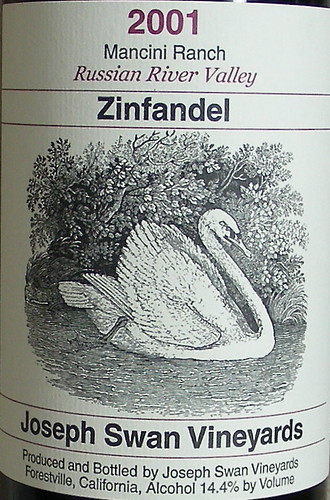
•
2001 Joseph Swan Zinfandel Mancini Ranch Russian River Valley: located in California's
Russian River Valley,
Joseph Swan Vineyards is a small family-owned winery specialized in vineyard designated Pinot Noir and old vine Zinfandel. The Mancini Ranch vineyard was planted in the early 1920's on the Santa Rosa plain of the Russian River Valley. Although the majority of the vineyard is Zinfandel, it is interplanted in the old traditional Italian style with a mix of varietals. My notes: red-brick color, attractive floral nose with notes of cinnamon, medium-bodied on the palate with complex berry flavors. Some guests mistaken it for a Pinot Noir. Personally, this was one of my favorite wines of the evening.
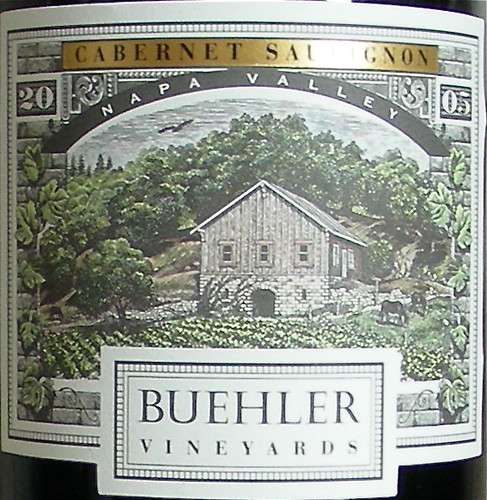
•
2005 Buehler Cabernet Sauvignon Napa Valley:
Buehler Vineyards is another small family-owned winery located in the mountains east of St. Helena in Napa Valley. The Napa Valley Cabernet Sauvignon is 100% Cabernet Sauvignon from grapes grown on hillside estate-owned vineyards (35%) blended with grapes from other Napa Valley vineyards located on the valley floor. My notes: deep garnet color, blackberry and plum aromas on the nose, medium bodied plate with a good balance between acidity and tannins, tasty fruity finish. A very good wine but not showy, which is what confounded some of the guests.
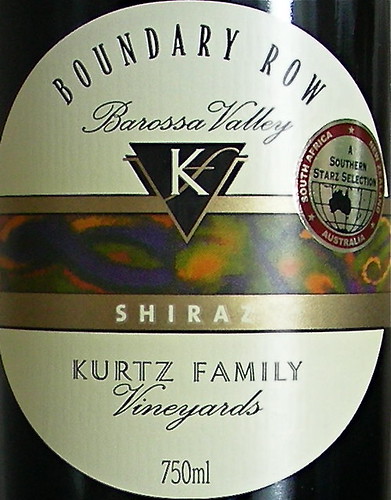
•
2005 Kurtz Family Vineyards Boundary Row Shiraz Barossa Valley:
Kurtz Family Vineyards is located in the Barossa Valley, South Australia. The name
Boundary Row refers to the fact that vineyards in the Barossa Valley traditionally have no fence lines to divide the properties between neighbors. Instead, a
Boundary Row is planted and the yield from this row is shared. The wine consists of 5 different blocks that were picked and fermented at differing times. My notes: dark and deep color, ripe fruit and pepper on the nose, full-bodied and warm on the palate, notes of eucalyptus on the finish. This was maybe the easiest wine to recognize.
For the second year in the row, our host Jean won again, with our friend Marcus in second place. Now, is Jean going to win again next year? Stay posted! Meanwhile, for our next tasting event, we'll be tasting some Pinot Noir.
Previous wine club tastings:
•
Wine and Cheese pairing•
Champagne Tasting•
Tasting the wines of South AmericaTechnorati tags:: wine food & drink
 The Domaine Le Sang des Cailloux, which literally means blood of the stones, is a 17 hectare estate in Vacqueyras, a small appellation in the southern Rhône Valley not very far from Châteauneuf-du-Pape. Almost 11 hectares are planted to Grenache with smaller plots of Syrah, Mourvèdre and Cinsault. The white grapes are Grenache Blanc, Clairette, Bourboulenc, Rousanne, and Viognier. The domaine is farmed using organic techniques. The cuvée Lopy refers to the name of the farm where the winemaker was raised. The blend is 75% 65 year old Grenache and 25% 40 year old Syrah.
The Domaine Le Sang des Cailloux, which literally means blood of the stones, is a 17 hectare estate in Vacqueyras, a small appellation in the southern Rhône Valley not very far from Châteauneuf-du-Pape. Almost 11 hectares are planted to Grenache with smaller plots of Syrah, Mourvèdre and Cinsault. The white grapes are Grenache Blanc, Clairette, Bourboulenc, Rousanne, and Viognier. The domaine is farmed using organic techniques. The cuvée Lopy refers to the name of the farm where the winemaker was raised. The blend is 75% 65 year old Grenache and 25% 40 year old Syrah. 